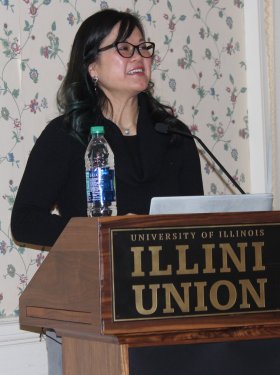On January 31, 2019, a record-breaking cold day in Illinois, Dr. OiYan Poon delivered an invigorating talk during her Dean’s Diversity Lecture Series presentation titled “Toward a Renewed Consciousness for Justice: Racial Justice or Racial ‘Just Us’ Among Asian Americans.” Dr. Poon is an assistant professor of higher education leadership and the director of the Race & Intersectional Studies for Educational Equity Center at Colorado State University.
In her talk, she debunked two fundamental misconceptions related to affirmative action and Asian-Americans:
- Racial quotas and test scores are the most important factors of selection criteria in the college admissions process.
- Asian-Americans oppose affirmative action.
Dr. Poon explained the complexity of affirmative action and Asian-Americans’ position in the debate about the topic from both a historical and constitutional perspective. Her talk revealed that it is critical to understand the ideological differences between notions of “racial justice” and “racial just us” as the public hears about current attacks on affirmative action.
In thinking about the immigration history of Asian-Americans, two victorious legal cases, the United States v. Wong Kim Ark (1898) and Lau v. Nicholas (1974), proved how powerfully a “racial justice is about all of us” ideology can change the game in how we educate and what it means to be a U.S.-born citizen.
Furthermore, Dr. Poon explained how affirmative action and holistic review are practiced in college admissions. She stated unequivocally that racial quotas and preferences in college admissions are illegal and unconstitutional. Additionally, there is no personality score in holistic admissions, which is one of the common misconceptions about college-admissions criteria.
The scholar also said that 68 percent of Asian-Americans support affirmative action, and that opponents of the practice are predominantly recent immigrants from mainland China.
To illustrate this point, Dr. Poon shared findings from her research (Poon, Segoshi, Tang, Surla, & Nguyen, 2017) and the report Asian Americans and Race-Conscious Admissions: Understanding the Conservative Opposition’s Strategy of Misinformation, Intimidation and Racial Division (Garces & Poon, 2018). Dr. Poon and her colleague interviewed 36 Asian-Americans who have advocated for or against affirmative action. The interviews produced two interesting findings: 1) both advocates and opponents have fundamental misunderstandings of what affirmative action is and how it works in selective admissions, and 2) recent rising Chinese American immigrants are more likely to oppose affirmative action. They tend to be affluent and educated but also racially isolated, with a minimal understanding of racial contexts and literacies in the United States.
Chinese Americans are the only Asian-American ethnic group opposed to affirmative action (Ramakrishnan & Wong, 2018). Despite their opposition, a significant fact is that unlike white opponents, Asian-American opponents acknowledge that racism exists. View her work on Asian-Americans and affirmative action and the report to discover additional findings and other factors associated with Chinese American opponents.
Indeed, Dr. Poon’s evidence-based narratives about affirmative action and Asian-Americans rectified the misleading fabrications of Ed Blum, the founder of Students for Fair Admissions, and certain media outlets. Her talk offered a meaningful discourse and way for Asian-Americans and other minoritized groups to develop a renewed and transformative consciousness of racial justice. She concluded her presentation with an important inquiry quoted from Julie J. Park’s book Race on Campus, leaving the audience to ponder the answer to this question:
What will it take to reimagine an entirely new educational system?
Watch the video of Dr. Poon’s lecture to learn more and discover past Dean’s Diversity talks.
References
- Garces, L. M., & Poon, O. (2018). Asian Americans and Race-Conscious Admissions: Understanding the Conservative Opposition’s Strategy of Misinformation, Intimidation & Racial Division. Civil Rights Project/Proyecto Derechos Civiles.
- Poon, O. A., & Segoshi, M.S. (2018). The racial mascot speaks: A critical race discourse analysis of Asian Americans and Fisher v. University of Texas. Review of Higher Education, 42(1), 235-267.
- Poon, O. A., Segoshi, M.S., Tang, L., Surla, K., & Nguyen, C. (2017, November). Empowered subjectivities: Asian Americans, racial ideologies, and affirmative action. Paper presented at Association for the Study of Higher Education, Houston, TX.
- Ramakrishnan, K., & Wong, J. (2018, June 18). Survey roundup: Asian American attitudes on affirmative action. AAPI Data Bits.
